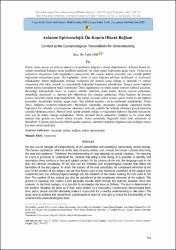Anlamın epistemolojik ön koşulu olarak bağlam
Citation
İbiş, F. (2023). Anlamın Epistemolojik Ön Koşulu Olarak Bağlam . Afyon Kocatepe Üniversitesi Sosyal Bilimler Dergisi , 25 (2) , 714-722 . DOI: 10.32709/akusosbil.1060483Abstract
Hiçbir metin insanı çevreleyen imkan ve koşullardan bağımsız olarak düşünülemez. Kaleme alınan her
metnin temelinde bulunan insan tecrübesi metinleri var eden insanî bağlamları açığa vurur. Dolayısıyla
metinlerin anlaşılması belli bağlamlarla mukayyettir. Bir metnin anlamı öncelikle onu vücuda getiren
bağlamları anlamaktan geçer. Bu bağlamları metin ve özne bağlamı şeklinde belirlemek ve özetlemek
mümkündür. Metin bağlamında metinde kullanılan dil, metnin sahip olduğu iç tutarlılık ve metnin
oluşumuna etki eden tematik ve terminolojik bağlamlar karşımıza çıkmaktadır. Kısaca metin bağlamı
metnin kurucu unsurlarını teşkil etmektedir. Özne bağlamında ise metni kuran öznenin tarihsel koşulları,
devraldığı antropolojik miras ve yazarın elinden çıktıktan sonra metni okuyan okurun psikolojik,
sosyolojik, ekonomik vs. durumu gibi faktörlerin öne çıktığını görüyoruz. Özne bağlamı da öznenin
kurucu unsurları olarak değerlendirilebilir. Bir metni var eden anlam zemini genel olarak bu iki bağlam
arasındaki diyalektikte kendini açığa vurur. Son tahlilde meseleyi şöyle özetlemek mümkündür: Metin
(text), bağlamla (context) mukayyettir. Metinlerin zamandan, mekandan, insandan, yaşamdan kopuk
bağlamsız bir ortamda yazılmışçasına okunması neticede sağlıklı bir anlama ediminin gerçekleşmesini
olanaklı olmaktan çıkarır. Metnin kendi içinde anlamlı olduğu ve bağlamdan habersiz biçimde okuyan bir
okur için de anlam taşıdığı muhakkaktır. Metin müstakil olarak anlamlıdır. Bağlam ise bu metni daha
anlamlı hale getiren en önemli anlam aracıdır. Metin anlamlıdır; bağlamla metin daha anlamlıdır da
denilebilir. Çalışma işbu kaydın felsefî açıdan analizini, metinleri anlarken bağlamın işlevselliğini ortaya
koymayı amaçlamaktadır. No text can be thought of independently of the possibilities and conditions surrounding human beings.
The human experience, which is at the base of every written text, reveals the human contexts that bring
the texts into existence. Therefore, the understanding of texts depends on certain contexts. The meaning
of a text is primarily to understand the contexts that bring it into being. It is possible to identify and
summarize these contexts as text and subject context. In the context of the text, the language used in the
text, the internal consistency of the text and the thematic and terminological contexts that affect the
formation of the text appear. In short, the context of the text constitutes the constituent elements of the
text. In the context of the subject, we see that factors such as the historical conditions of the subject who
created the text, the anthropological heritage and the situation of the reader reading the text come to the
fore. The context of the subject can also be considered as the constituent elements of the subject. The
ground of meaning that creates a text generally reveals itself through the dialectic between these two
contexts. In the final analysis, it is possible to summarize the issue as follows: The text is determined to
the context. Reading the texts as if they were written in a contextless environment disconnected from
time, place, people and life ultimately makes it impossible for a healthy understanding to take place. The
study aims to analyze this record from a philosophical point of view and to reveal the functionality of the
context while understanding the texts.
Source
Sosyal Bilimler DergisiVolume
25Issue
2URI
https://dergipark.org.tr/tr/pub/akusosbil/issue/78272/1060483https://hdl.handle.net/11630/10903
Collections
- Cilt 25 : Sayı 2 [25]



















